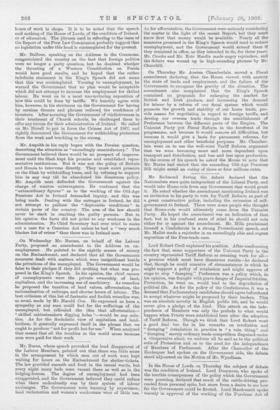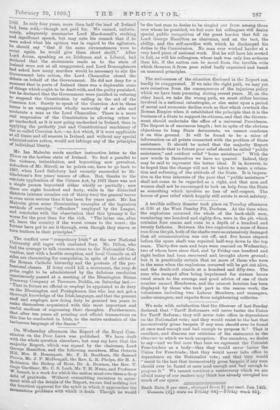In the House of Lords on Thursday the subject of
debate was the condition of Ireland. Lord Dunravon, who spoke of the terrible consequences of the policy which the Government were pursuing, declared that much of the cattle-driving pro- ceeded from personal spite, but more from a desire to see how far the Government could be flouted. Lord Macdonnell spoke warmly in approval of the working of the Purchase Act of 1903. In only four years, more than half the land of Ireland had been sold,—though not paid for. We cannot, unfortu- nately, adequately summarise Lord Macdonnell's striking and significant speech, but may note his remark that if, he Were asked what his opinion was in regard to the agitators, he should say "that if the same circumstances were to occur again, he would give them short shrift." After Lord Arran, speaking as an Irishman and a Liberal, had declared that the statements made as to the state of Ireland were not at all exaggerated, and Lord Donoughmore had asked how many murders would be necessary to stir the Government into action, the Lord Chancellor closed the debate on behalf of the Government. He did not deny for .a moment that in parts of Ireland there was a deplorable state of things which ought to be dealt with, and the guilty punished, but he declared that the Government were justified in refusing to suspend the Constitution by calling in the aid of the Coercion Act. Surely to speak of the Coercion Act in these terms is an exaggeration wholly unworthy of so able and moderate a man as the Lord Chancellor. There is a more real suspension of the Constitution in allowing crime to go unchecked, as it is now going unchecked in Ireland, than in applying the perfectly just and Constitutional machinery of the so-called Coercion Act,—an Act which, if it were applicable at all times and all seasons in Ireland, and without any special administrative action, would not infringe any of the principles of individual liberty.











































 Previous page
Previous page